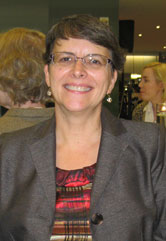Newsroom Archive
 Professor Rosemary Barberet of the Sociology Department and director of the Master of Arts Degree Program in International Crime & Justice was selected as the new editor for the Division of Women and Crime’s journal, Feminist Criminology. Her term will begin this summer. Barberet’s editorship tessellates with the mission and work of the College´s Gender Studies Committee and with the release in March of her book, Women, Crime and Criminal Justice: A Global Enquiry. The Journal’s managing editor will be John Jay Ph.D. student, Diana Spahia.
Professor Rosemary Barberet of the Sociology Department and director of the Master of Arts Degree Program in International Crime & Justice was selected as the new editor for the Division of Women and Crime’s journal, Feminist Criminology. Her term will begin this summer. Barberet’s editorship tessellates with the mission and work of the College´s Gender Studies Committee and with the release in March of her book, Women, Crime and Criminal Justice: A Global Enquiry. The Journal’s managing editor will be John Jay Ph.D. student, Diana Spahia.
The Division on Women and Crime was founded in the 1980s and the journal was founded in 2006 with the purpose of advancing discussion, awareness and relevancy among scholars and policy makers relevant to gender and crime.
Barberet is the journal’s fourth editor and says that her overall goals are to increase readership, raise the journal’s impact factor and to ensure it has an international scope.
“There are other journals that publish research on women, but Feminist Criminology is different because it is affiliated with the DWC. Not only does it encourage feminism in criminology, but it encourages a whole range of scholarship including women as offenders, as survivors, as criminology professional, the gender lens, and the feminist examination of masculinities and sexualities.”
Over the past decade, women’s rights and equality have been seen by some as passé, says Barberet, considered not as important as other social justice struggles, or overlooked as a battle already won. However, Barberet believes that the issues of women’s rights and equality are still as urgent and pertinent as they were in the 20s, 60s and 70s.
“It’s a journal meant to shift the conversation for both policy makers and the general public. Generally women are still ignored, often stereotyped or exaggerated for roles they play or are minimized because they are a small number of offenders. Gender and sex are the strongest predictors of offending, but largely ignored by theorists, policy makers and researchers.”
When Barberet was pursuing her undergraduate degree, she volunteered in the women section of a jail, which she observed had lacked many basic services. This she said was a consequence of a system built by men, for men.
“Around the globe, there is no country where you will find that the mass of offenders are women; they are overwhelmingly men. We must ask why that is, what is restraining women from offending and what is pushing men to offend?”
Barberet’s academic career thrived in Spain where much of her research on women and crime was funded by the Women’s Institute – a government body designated to introduce women’s issues into mainstream Spanish society. Their grant system is crucial to affecting social change and influencing research conducted on women in the university system. Currently, the U.S. does not have anything comparable to a government agency devoted to the promotion of women’s rights.
 Inside JJC (Faculty & Staff)
Inside JJC (Faculty & Staff) Technology Services Status
Technology Services Status

